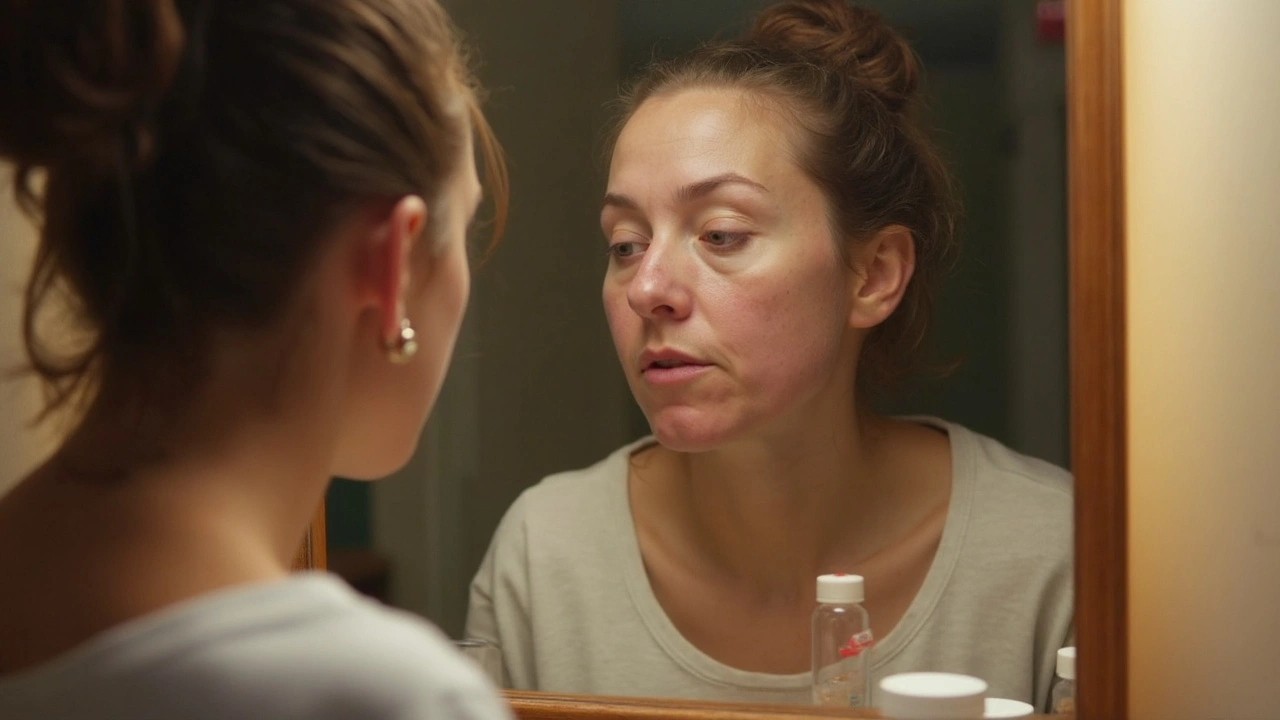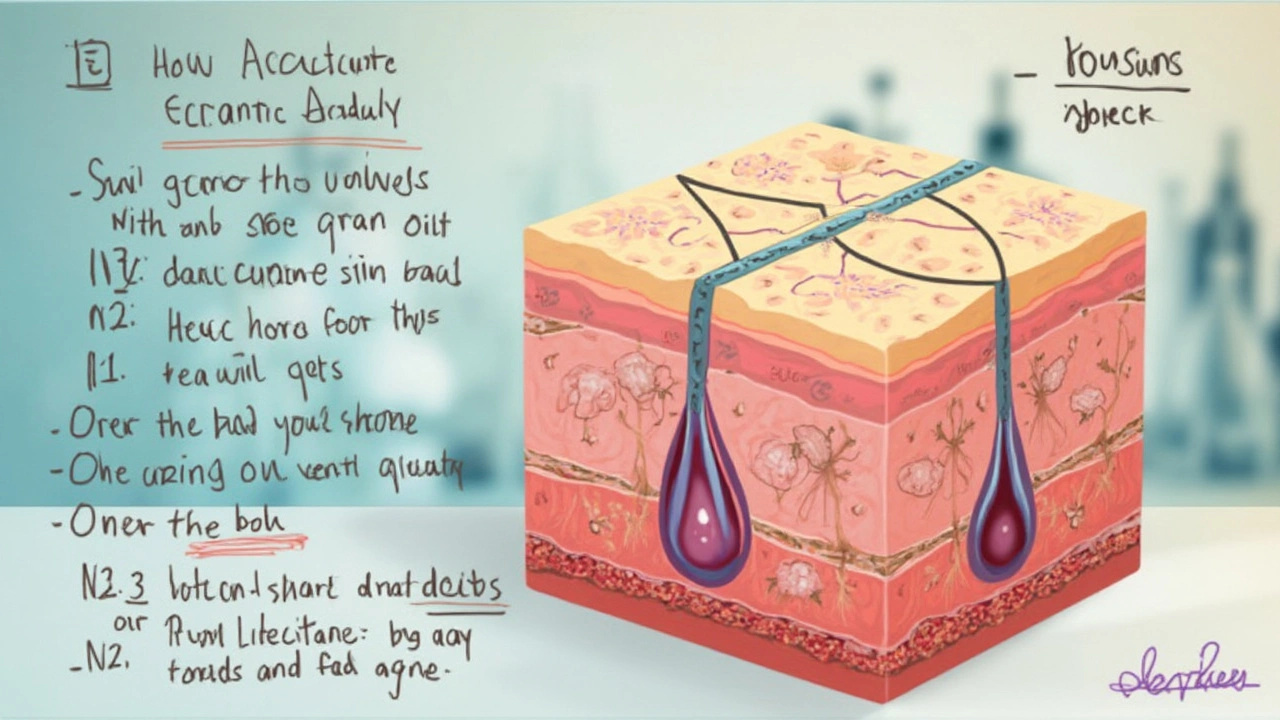Accutane Guide: Isotretinoin Treatment, Side Effects, and Real Stories
 Jun, 6 2025
Jun, 6 2025
Who knew a single pill could spark as many rumors as Accutane? Whispered about in school bathrooms and debated on beauty forums, this infamous acne treatment has a reputation that stretches far beyond the doctor’s office. I’ll never forget how nervous I felt picking up my first prescription—it almost felt like holding a tiny grenade, filled with hope but maybe also hidden danger. Years later, when my younger cousin considered starting it, she came to our kitchen table with a list of fears, peppering me with questions I wish someone had answered honestly for me.
Understanding Accutane: Science, Myths, and Who Needs It
Let’s talk about what Accutane actually is. Its medical name is isotretinoin. It’s a derivative of vitamin A and doesn’t work like your regular acne creams or antibiotics. It goes deep, working on nearly every cause of acne: it shrinks oil glands, reduces inflammation, and prevents clogged pores before they even start. Studies in dermatology journals show isotretinoin can put nodular and cystic acne into remission for 80-90% of patients after one round. That means it’s not just a band-aid—sometimes, it’s more like a reset button for your skin.
Here’s one wild fact: Accutane wasn’t even invented as an acne drug. Back in the 1970s, researchers were hoping for a cancer treatment. But during trials, everyone’s breakouts disappeared like magic. Science ran with it. But with powerful effects come strong controversies. If you Google it, you’ll find stories ranging from miraculous recoveries to lists of horror-movie side effects.
But who actually gets a green light for Accutane? It’s not for occasional pimples. Dermatologists usually keep it for those with severe, scarring cystic acne or stubborn outbreaks that defy every other cream, pill, or cleanser. If you’re dealing with mild breakouts, your doctor will try lots of other options first—antibiotics, retinoids, birth control pills. For Accutane, doctors follow strict guidelines, blood work, and regular appointments. The process can almost feel like joining a secret club, except you’re not allowed to get pregnant, drink much alcohol, or donate blood.
One common myth: your acne must be a wreck to qualify. Actually, some get it for less severe but persistent, painful spots that refuse to budge. Severity and risk of scarring are huge factors, but so is how much your acne affects your mental health. If it keeps you from leaving the house or makes looking in a mirror a nightmare, a good dermatologist listens.
Accutane isn’t all-or-nothing. Dosing depends on your weight, how bad your acne is, and how well you tolerate the drug. Sometimes it’s short and intense; other times, it’s a slow burn over months. Don’t expect overnight miracles. Most people notice their skin gets worse before it gets better. Imagine running a marathon in mud—you have to slog through a rough phase before hitting dry land.
If you’re worried about scarring, time really matters. Accutane works best when you catch serious acne before years of pitting and marks set in. The longer severe breakouts last, the harder it is for skin to bounce back. That’s why seeing a dermatologist quickly—not just a regular doctor—makes a difference. They know the warning signs and don’t waste time with things that won’t cut it for the severe cases.

The Reality of Taking Accutane: Side Effects, Safety, and What You Actually Feel
Reading through Accutane’s list of potential side effects can sound scarier than a horror movie marathon, but the reality—at least for most people—is a little more mundane (if still annoying). The very thing that makes isotretinoin so powerful, shutting down those overactive oil glands, also leaves your skin and lips as dry as a failed winter moisturizer experiment. Hands down, the most common complaint is lips that crack, peel, and sting, no matter how much you slather on balm. You may find yourself stockpiling Aquaphor or Vaseline at every cash register in town.
Dryness isn’t just for lips though. Prepare for your skin, nose, and even eyes to lose their usual moisture. Bloody noses and red, itchy eyes pop up in about one out of four people. I learned to put a humidifier next to my bed and carried mini bottles of eyedrops everywhere. When my friend Maya started Accutane, she discovered nosebleeds could strike during math class with zero warning. Carrying tissues soon became her accidental fashion statement.
About 10-30% of users report joint aches, especially with heavy exercise. My husband Ethan, who ran marathons while on Accutane in college, described it as feeling like he was 60 for a few months. Most side effects go away after stopping the drug. But you get used to skipping leg day and opting for gentle walks instead.
There are serious risks, too, and this is where things get heavy. Accutane is extremely dangerous during pregnancy—one dose can cause severe birth defects. That’s why strict regulations in the U.S. force anyone with childbearing potential to use two forms of birth control and take monthly pregnancy tests. Filling just one prescription could mean five different checkboxes, an online quiz, and a signed contract saying you won’t try to conceive. Some find the system invasive, but the statistics speak for themselves: birth defects linked to isotretinoin are devastating and dramatically reduced by these precautions.
There’s also the mental health conversation. Reports of mood swings, anxiety, and depression with Accutane have led to government warnings. For years, the stories were mostly scattered—some studies found a link, others didn’t. More recent, massive studies (like the 2023 UK cohort of over 10,000 users) show rates of depression are a little higher, but not dramatically so. Still, doctors now screen patients more closely and ask about past or current mental health struggles at every check-in. My younger cousin struggled with anxiety before starting Accutane; she tracked mood changes daily in a journal and kept close contact with her therapist. For her, being watched closely kept things safe.
| Common Side Effect | Approximate Frequency | Typical Solution |
|---|---|---|
| Dry Lips | Almost 100% | Lip balm, ointments |
| Dry Skin | 90% | Mild cleansers, moisturizer |
| Bloody Nose | 25-30% | Humidifier, nasal gel |
| Muscle/Joint Pain | 10-30% | Avoid overexertion |
| Mood Changes | 5-10% | Monitor, talk to doctor |
| Sun Sensitivity | 40-60% | Sunscreen, hats |
Something else that doesn’t get enough airtime: Accutane temporarily makes your skin extra sensitive to sunlight. Sunburns can happen way faster. When I was on it, I made the rookie mistake of skipping sunscreen while walking my dog—my nose peeled for days. Sunscreen isn’t optional here; it’s survival. And don’t expect to wax or get laser treatments without consequences. Your skin will be in fragile mode for months.
Liver health gets tracked closely. Every month, you’ll give a small vial of blood so your doctor can make sure your liver enzymes and cholesterol stay in the safe zone. Problems are rare but do pop up, especially if you drink alcohol or have pre-existing health issues. I swapped my wine nights for herbal tea while taking it, and honestly, my skin thanked me twice over.
Tips make the journey better. Stay hydrated—water, not just coffee or soda, keeps things moving. Stock up on thick, gentle moisturizers and non-foaming cleansers. Keep an emergency kit with hydrating lip balm, hand cream, and eyedrops. Avoid exfoliating or harsh treatments, even if your breakout flares at first. Be gentle—your skin is fighting a big battle and needs time to recover.
- Never skip monthly blood tests or doctor check-ins
- Keep track of any emotional changes and communicate them
- Avoid waxing, laser hair removal, or aggressive facials
- Use sunscreen daily, even on cloudy days
- Stick to gentle products—ditch acne scrubs or toners
- Eat balanced meals while on medication—Accutane absorbs better with food, especially fats

Life After Accutane: Results, Scars, and Keeping Your Skin Clear
Isotretinoin isn’t a magic eraser, but for most, it’s pretty close. Clinical reviews show about 85% of patients see major, lasting improvement after just one course—which usually lasts 5 to 7 months. Some only need one round; others might need a second, lower dose months or years later for lingering spots. My skin, once cratered and inflamed, stayed stubbornly clear even after bad sleep or diet slip-ups.
The mental shift surprised me more than the physical one. Friends who used to avoid eye contact rediscovered selfies or started running makeup-free errands. Small stuff, right? But for anyone who’s hidden behind hair or hoodies, that’s freedom. The relief is real. Some wear scars from their acne era, but the feeling of finally moving forward can matter way more.
But what about relapses or new breakouts? It happens. According to one big 2020 French study, about 10-20% of patients might see return breakouts within two years, usually milder than before. Touch-up cycles at a low dose fix tough cases. Maintenance with topical retinoids or gentle cleansers can keep skin happy. My dermatologist recommends skipping harsh spot treatments after Accutane—your skin rarely needs them, and gentler care helps it recover fully.
Scarring is a whole separate drama. Accutane can freeze new scars in their tracks, but old, deep pitted scars may need distinct treatments after you finish: think chemical peels, professional microneedling, or laser resurfacing. Never try these on active Accutane; your skin can’t handle it. Wait at least six months, often a year, to let skin regain strength.
There are some quirks that people wish they knew before starting. For example, waxing eyebrows or upper lips can yank off skin—stick to tweezers or wait it out. Certain supplements (like vitamin A) are absolutely off-limits. And don’t panic about hair shedding or brittle nails; it’s usually temporary and regrows once the meds are done.
Relief from body acne—the kind that loves to ruin beach trips and tank tops—is one of isotretinoin’s superpowers. Most patients see clear backs and chests, which usually resist regular cleansers or scrubs. For teens, the transformation is often dramatic, but adults can now get the same benefits as regulations loosen up and awareness spreads.
Cost is another concern. In the US, insurance usually covers Accutane for severe acne, but copays add up—especially when you include required monthly doctor visits and blood work. Generics make a huge difference, sometimes slashing costs by 70% or more. My cousin shopped pharmacies to compare prices and saved a bundle by avoiding big chains.
After Accutane, skin may not be perfect, but it’s new. Gone is the fear of tomorrow’s breakout fest. You get that little joy back from running a finger across your cheek and feeling… nothing but skin. The mental baggage starts to lift. It’s a freedom most people with clear skin will never quite understand—but for those who need it, Accutane can be worth every cracked lip and awkward blood test.

Karla Luis
June 16, 2025 AT 21:01Accutane made my lips feel like sandpaper but my skin looked like a newborn’s so i’ll take it
also learned to love Vaseline like it was my emotional support ointment
jon sanctus
June 17, 2025 AT 22:51Wow. Just wow. You act like this is some sacred ritual when it’s basically chemical castration with a side of existential dread
and you’re acting like you won the lottery when you stopped breaking out
you didn’t survive a war you just avoided acne like it was a bad date
Kenneth Narvaez
June 19, 2025 AT 05:41While the clinical efficacy of isotretinoin in modulating sebaceous gland activity is well-documented via randomized controlled trials with >85% remission rates, the confounding variables related to hepatic transaminase elevation and triglyceride dyslipidemia remain underreported in patient narratives
the data suggests a dose-dependent hepatotoxicity threshold that requires strict monitoring
Christian Mutti
June 20, 2025 AT 15:19I am deeply moved by this post. Truly. It’s not just about acne-it’s about identity. It’s about the quiet shame of hiding behind scarves in July. It’s about the courage to endure dry lips and bloodied noses for the sake of seeing yourself in the mirror without flinching.
And yes, I cried when I read about the humidifier. Because this isn’t medicine. This is redemption.
Thank you. 🙏
Liliana Lawrence
June 21, 2025 AT 20:42OMG YES!! I was on Accutane for 7 months and I went from crying in the shower every morning to posting selfies with no makeup and I swear I felt like a new person!!
Also, I started drinking like 3 liters of water a day and my skin looked like it had been airbrushed by angels!!
And don’t even get me started on the lip balm hoarding!! I had 17 tubes in my purse at once!!
Also, I got my eyebrows waxed after 8 months and it was a disaster so don’t do that!!
Also, my mom cried when she saw my face!!
Also, I started dating!!
Also, I got a dog!!
Also, I started meditating!!
Also, I bought a new bed!!
Also, I changed my whole life!!
Accutane is magic!!
Also, sunscreen!!
Also, don’t forget the eyedrops!!
Also, I love you all!!
Also, I’m still on it!!
Also, I’m not done!!
Also, I’m not done!!
Also, I’m not done!!
Sharmita Datta
June 23, 2025 AT 03:53you know isotretinoin was originally developed by a pharmaceutical cartel to control youth behavior and suppress natural hormone expression
the dry skin is just a distraction
the real goal is to make you dependent on moisturizers and blood tests so you never question the system
and why are there so many pregnancy warnings? because they dont want you to reproduce if youve been chemically altered
also my cousin in india got depression after taking it and then vanished into a government clinic
they dont tell you this
they just give you the pill and smile
mona gabriel
June 24, 2025 AT 13:21It’s funny how something so brutal can give you back your life
you don’t celebrate the clear skin
you celebrate not being afraid to look in the mirror anymore
the rest? the dry lips, the nosebleeds, the weird joint pain
they’re just the price of silence
the silence you didn’t know you were screaming in
Phillip Gerringer
June 25, 2025 AT 14:47People treat Accutane like it’s a gift when it’s a last-resort chemical intervention for poor skincare hygiene
you didn’t cure acne you just suppressed it with a nuclear option
if you had used salicylic acid properly and stopped eating dairy you wouldn’t have needed this
your skin was never the problem your habits were
jeff melvin
June 25, 2025 AT 15:31Accutane isn’t a treatment it’s a liability management protocol
the side effect profile is a regulatory shield
the pregnancy tests aren’t for safety they’re for legal indemnity
the bloodwork isn’t medical it’s corporate compliance
you’re not getting better you’re just being monitored
and you’re okay with that
because you’re desperate
and they know it